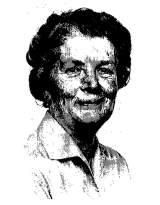The next Alma Howard Lecture:
Thursday, September 25, 2025 at 10:00am
McIntyre Medical Sciences Building, Room 504

Alma Howard was a radiobiologist who made fundamental contributions to cell biology. Born on 23 October, 1913 in Montreal, she began her education at the Trafalgar School for Girls and then continued her studies at McGill University. In 1934, she graduated with an Honours B.Sc. in Botany and Zoology and went on to pursue graduate studies in the Department of Genetics under Professor C. L. Huskins. Her Ph.D. thesis, submitted in 1938, was titled "The correlation between chromosome behaviour and susceptibility to mammary gland cancer in mice", for which she earned the Governor General's Academic Medal. Between 1939 and 1940, she was demonstrator in Genetics at McGill and held the Finney-Howell Research Fellowship.
By 1949, Alma Howard had joined the team of L. H. Gray at the U.K. Medical Research Council's Radiotherapeutic Research Unit at Hammersmith Hospital in England. She worked alongside other scientists interested in the biological effects of ionizing radiation, including physicist Stephen Pelc. Howard and Pelc used a botanical experimental system, the bean root Vicia faba, to pursue research with Phosphorus-32. By chance, they discovered that a simple acid digestion removed most of the Phosphorus-32 not synthesized into DNA and, by observing its uptake into the nucleus of dividing cells, deduced that DNA replication occurs during a limited period in interphase, which they termed the "S-phase". In 1953, Howard and Pelc published their discovery in a paper titled "Synthesis of Deoxyribonucleic Acid in Normal and Irradiated Cells and Its Relation to Chromosome Breakage". Their paper was the first to attribute a timeframe to cellular life, forming the basis of cell kinetics and thus enabling the development of cell cycle studies in medicine and cancer research.
Alma Howard also worked with Michael Ebert at Hammersmith, and together they discovered that excess pressures of the rare gases xenon, krypton and argon could suppress the oxygen enhancement effect on the radiation killing of Vicia faba cells. She left Hammersmith in 1956 to join the new radiobiology research unit L. H. Gray had established at Mount Vernon Hospital. In 1960, she was appointed Secretary General of the 2nd International Radiation Research Congress, held in 1962. Howard and Ebert moved to Paterson Laboratories in 1963, where Howard was Head of the Radiobiology Group. As joint editors, they formed the journal Current Topics in Radiation Research. By 1966, Howard was Deputy Director of Paterson Laboratories and Joint editor of the International Journal of Radiation Biology.
In memory of Alma Howard, an endowment to McGill University was established in 1986 by her family, friends and colleagues for the purpose of promoting the field of Genetics. To achieve this, funds from the endowment are used to sponsor public and scientific meetings on topics related to Genetics and to support graduate students and postdoctoral fellows. In 2003, the Department of Biology began hosting the annual Alma Howard Lectures which explore ongoing research in Genetics and Cellular, Molecular and Developmental Biology.
Past Seminars in the Alma Howard Lecture Series
| Date | Speaker | Title | |
|---|---|---|---|
| 2025 | Dr.Nicole King University of California at Berkeley |
The secret lives of choanoflagellates | |
| 2024 | Dr. Christine Jacobs-Wagner Stanford University |
Cracking Old Mysteries of Cellular Replication | |
| 2023 | Dr. Tony Hyman Max Planck Institute of Molecular Cell Biology & Genetics |
The Cell as a Polyphasic System | |
| 2020 | Dr. Dominique C. Bergmann Stanford University |
Asymmetric and stem-cell divisions to build adaptable plant bodies | |
| 2018 | Dr. Carl-Phillip Heisenberg Institute of Science and Technology, Austria |
Cell and tissue mechanics in zebrafish gastrulation | |
| 2017 | Dr. Angelika Amon Koch Institute for Integrative Cancer Biology, MIT |
Aneuploidy and cancer - a complicated relationship | |
| 2016 | Dr. David Sherratt University of Oxford |
In vivo single-molecule biology of chromosome repair and segregation | |
| 2014 | Dr. Barbara Meyer Howard Hughes Medical Institute |
Tethering and Repressing Chromosomes via Molecular Machines | |
| 2012 | Dr. Tim Stearns Stanford University |
Centrosomes, Cilia and the Cell Cycle | |
| 2011 | Dr. Norbert Perrimon Howard Hughes Medical Institute |
Tissue homeostasis in Drosophila | |
| 2010 | Dr. Margaret T. Fuller Stanford University School of Medicine |
Regulation of self-renewal and differentiation in an adult stem cell lineage | |
| 2009 | Dr. James Nelson Stanford University School of Medicine |
Epithelial Cell-Cell Adhesion and Polarity | |
| 2008 | Dr. Jennifer Lippincott-Schwartz NIH, Bethesda |
New fluorescent imaging techniques for analysis of protein transport pathways and the near molecular resolution of proteins | |
| 2007 | Dr. Nori Satoh Kyoto University |
Developing a model organism – the ascidian chordate Ciona Intestinalis | |
| 2006 | Dr. Craig Mello Howard Hughes Medical Institute |
RNAi and Development in C. elegans | |
| 2005 | Dr. Thomas Pollard Yale University Medical School |
Regulation of actin filament dynamics during cellular motility and cytokinesis | |
| 2004 | Dr. Ruth Lehmann New York University Medical School |
Navigating the embryo: Germ cell migration in flies and mice | |
| 2003 | Dr. Elizabeth Robertson Harvard University |
From Fertilization to Gastrulation: Axis Formation in Mouse Development |